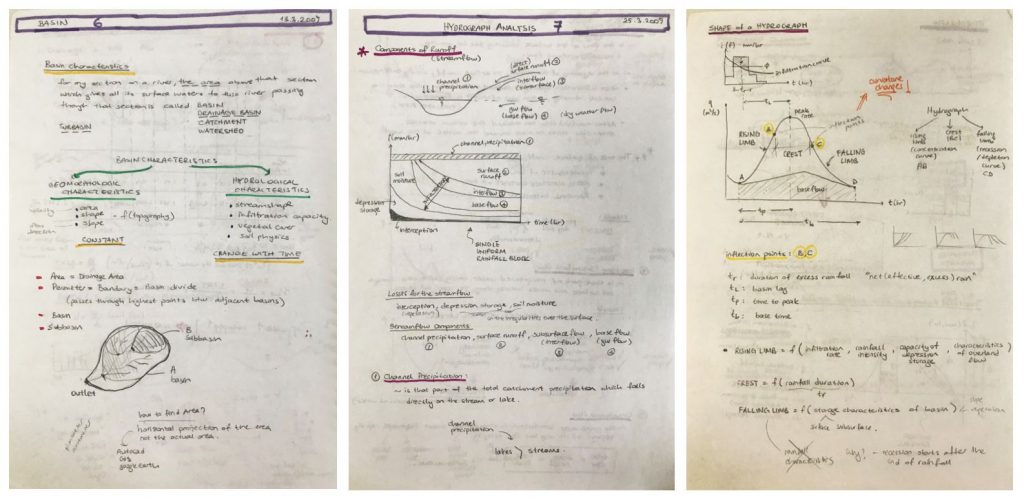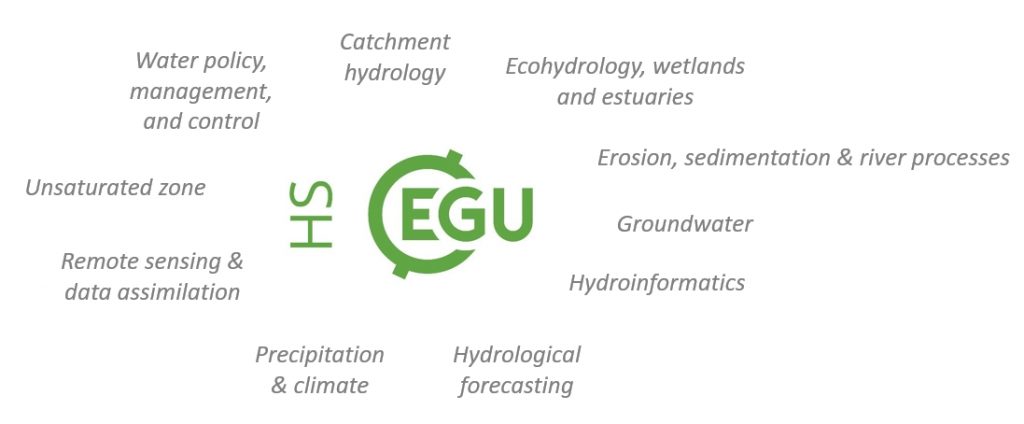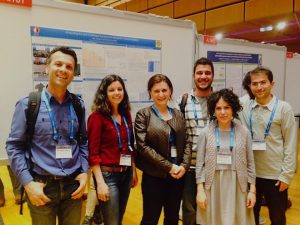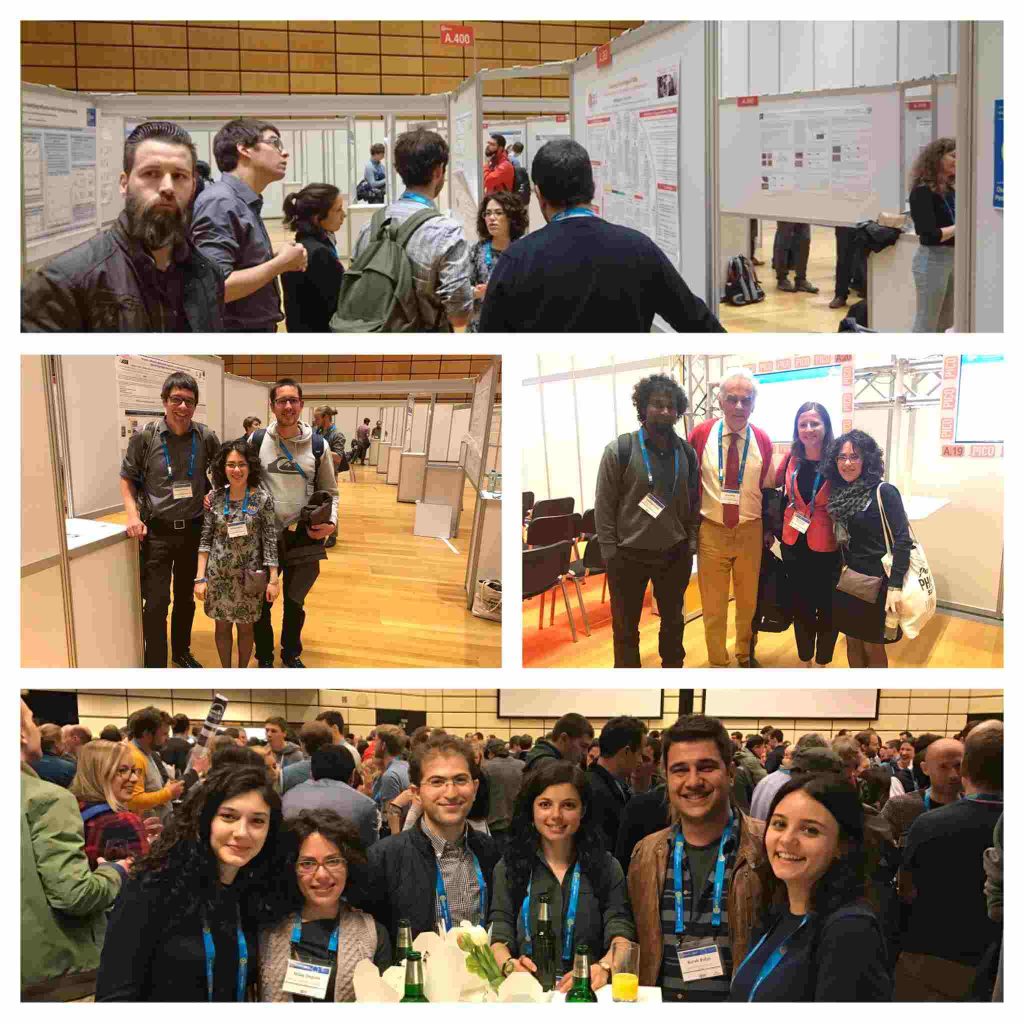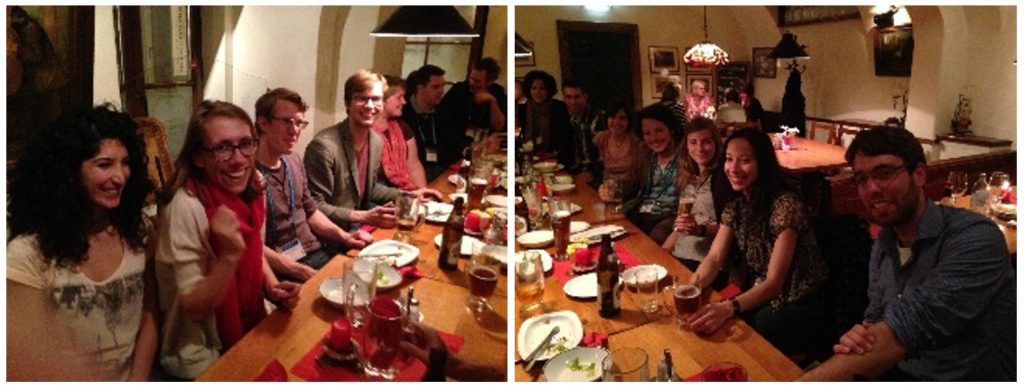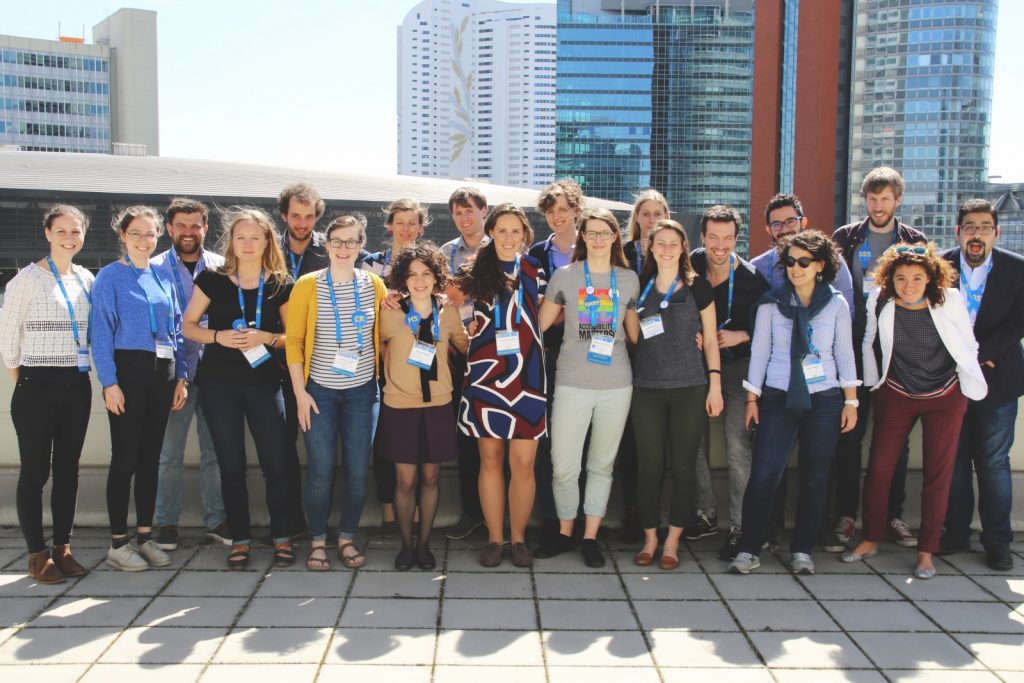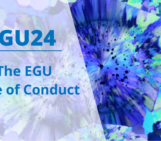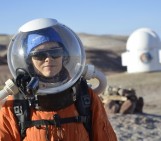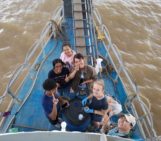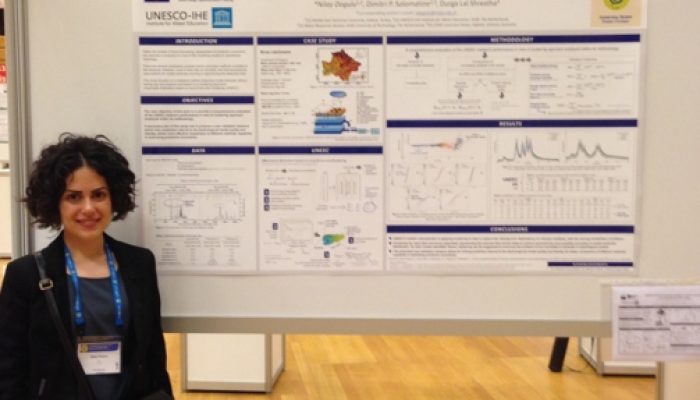
In addition to the usual GeoTalk interviews, where we highlight the work and achievements of early career researchers, this month we’ll also introduce one of the Division early career scientist representatives (ECS). They are responsible for ensuring that the voice of EGU ECS membership is heard. From organising short courses during the General Assembly, through to running and attending regular ECS representative meetings, their tasks in this role are varied. Their role is entirely voluntary and they are all active members of their research community, so we’ll also be touching on their scientific work during the interview.
Today we are talking to Nilay Dogulu, ECS representative for the Hydrological Sciences (HS) Division and past chair of the Young Hydrologic Society.
Before we get stuck in, could you introduce yourself and tell us a little more about yourself, your involvement with EGU and how you became interested in hydrology?
I am a PhD candidate at the Middle East Technical University (METU) in Ankara, Turkey, researching clustering methods for data-driven hydrology at the Water Resources Laboratory. This year I attended the General Assembly (GA) in Vienna for the fifth time in a row. Since 2014, the Assembly has been the one and only conference that I have persistently and willingly participated in. The Hydrological Sciences (HS) division’s scientific programme at the GA had a special role in shaping my career as a researcher, so I would like to share my journey in the hydrological sciences lightened up by the EGU GA and its HS community.
First, little about me. I am a civil engineer by training. I was a third year (BSc) student at METU (ODTU) when I took the course “Engineering Hydrology.” It was the first time I learned about the terms catchment, basin and hydrograph. In that very semester I had the opportunity to participate in the 5th World Water Forum in Istanbul. That was it. I was determined to specialize in water for my future career.
To broaden my understanding of hydrological processes and gain a critical view of the latest hydrology topics, I gathered the courage—as only a BSc student at the time—to attend the 6th National Hydrology Congress and the 2nd National Flood Symposium. Then a three-month internship at the State Hydraulic Works of Turkey introduced me to the wider community of hydrological sciences in the world.
In Fall 2011, I joined the FLOODRisk Master to study floods, from modelling them to understanding their socio-economic effects. This two-years programme enriched my academic background on flood risk management and provided me with different insights into water-related problems.
Could you tell me about your first experience with the EGU General Assembly?
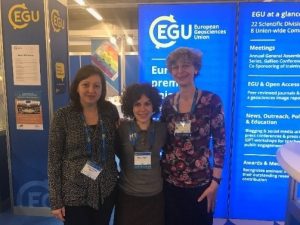
With EGU HS Division president Elena Toth (right) and president-elect Maria-Helena Ramos (left) at EGU 2018
The EGU GA brings together researchers from all around the world. The EGU Hydrological Sciences Division is EGU’s largest division with a diverse and comprehensive scientific programme at the GA, large enough to fill in the whole second (red) floor of the conference venue.
The EGU HS division is a great platform aimed at addressing current research challenges in hydrology. During the GA, one can follow up with the latest research on various topics within these areas and network with members (of all stages) of this great community. At the 2018 EGU GA, hydrological sciences programme had 2350 abstracts submitted to 91 HS-lead sessions (66 oral and poster sessions, 6 poster only sessions, 19 PICO sessions)—equivalent to 13.5% of total EGU GA submissions.
Given this, I was very motivated to experience the General Assembly for the first time! I submitted an abstract summarizing part of my MSc research—on predictive uncertainty estimation for flood forecasting using data-driven modelling techniques; and once it was accepted, I started to get ready for EGU and Vienna! Flight and accommodation booked, poster printed, weekly conference schedule prepared. This was the first poster presentation of my career and I was quite excited. Luckily, all went really well.
I remember having a busy week at EGU 2014: from presenting my first poster, working on a manuscript with my co-authors, as well as attending project meetings, sessions on flood forecasting and flood risk management, and short courses organized by the Young Hydrologic Society (YHS).
There were many interested people visiting my poster and asking questions. There were many posters I visited too—I have to admit, sometimes I asked so many questions that the presenters thought I was an OSPP Award judge.
Throughout the week I listened presentations, many of which were given by researchers I cited in my master’s thesis. Matching the papers with authors’ faces was amazingly so much fun! Moreover, I arranged a small meeting with my co-authors to discuss the manuscript draft (which has been later published in HESS) that we had only been working on remotely before then.
At the time, I was also working for the EU-FP7 project ASTARTE (Assessment, STrategy And Risk Reduction for Tsunamis in Europe). The EGU GA is an excellent time for research project teams, editorial boards of journals, etc. to schedule meetings. ASTARTE team (26 partners from 16 countries) also took this opportunity to meet up to discuss the progress following the project’s first 6-months period. During this meeting, I presented one of the very important deliverables of the project which focused on tsunami resilience from a social sciences perspective.
On the Saturday after the conference there was the Vienna Catchment Science Symposium organized by the Vienna University of Technology Centre for Water Resources Systems. It proved to be a very enlightening symposium for a young hydrologist.
Sounds like a great first experience! How has your time at the GA changed over the years?
After enjoying the academic fun of EGU 2014, I wanted to come back to Vienna for EGU 2015. Another reason was that I was very curious why people were heading to the conference venue on the very last hours of the last day (Friday): I left around 5 pm and many people were coming out of metro!
In 2015 I had one PICO presentation and two short course convenerships, How to write (and publish) a scientific paper in hydrology and Hydroinformatics for Hydrology. Both were co-organized with the Young Hydrologic Society and proved to be very successful!
Without any hesitation, I decided to attend EGU 2016 and EGU 2017 in the next years. Although I didn’t have any presentations in 2016, listening to presentations covering my research interests helped me stay updated and synthesise various perspectives on overarching problems in hydrology. The sessions kept me thinking about some questions that had been tingling my mind—which later became the research questions in my PhD thesis proposal.
At EGU 2017, my poster presentation was a literature review on application of clustering methods in hydrology, and actually it attracted more people than I expected. EGU poster sessions provide an excellent way to bring together early career researchers while they stand in front of their posters, paving the way for interesting discussions.
My fifth year at the EGU GA last April was great too: including two posters, sessions to co-/convene, YHS events (from short courses to PICO sessions), the EGU ECS Representatives Workshop, YHS Hydrodrinks, the HS division meeting, medal lectures and many other activities. Being an experienced EGU GA participant, I also served as a mentor as part of the EGU mentoring programme designed to help novice conference attendees navigate their first EGU experience.
Almost forgot! On Friday evening, the conveners’ reception (and party, with a different theme every year) takes place at the ACV.
In addition to being an EGU ECS representative, you also are involved with the Young Hydrologic Society (YHS). Could you tell me more about this organisation and your role in YHS?
YHS is a bottom-up initiative that aims to help early career hydrologists interact and actively participate within the hydrological sciences community and beyond. We are a group of motivated PhDs and postdocs who enjoy serving our very own community, considering the needs and interests of young hydrologists.
The YHS is most actively involved with the EGU GA, where we organizing short courses, scientific sessions and social events. The full list of all events that YHS has organized for the EGU GA since 2013 can be found on the YHS webpage. The open call for session proposals for EGU GA 2019 has just closed (deadline 6 September) – there have been quite a number short course submissions (in cooperation with YHS) that will play a significant role in shaping the HS programme for ECSs. YHS Hydrodrinks event held annually at the EGU GA is now a 5-year-old tradition where we meet our new team members. If you are planning to come to EGU 2019, don’t miss the chance to meet fellow hydrologists at the Hydrodrinks (however, please note that this is not a sponsored event). Contributing to the academic and social development of early career hydrologists by organising activities at the EGU GA is a unique and rewarding experience, so get involved!
I joined YHS after meeting the team at EGU 2014. Since then I couldn’t help myself but contribute to the aims of the society in many ways—like organizing short courses at conferences (e.g. Hydroinformatics for Hydrology at the EGU GA), managing and contributing to the YHS Blog (Streams of Thought and Hallway Conversations), and acting as a Board member (secretary 2015-16, chair 2016-17).
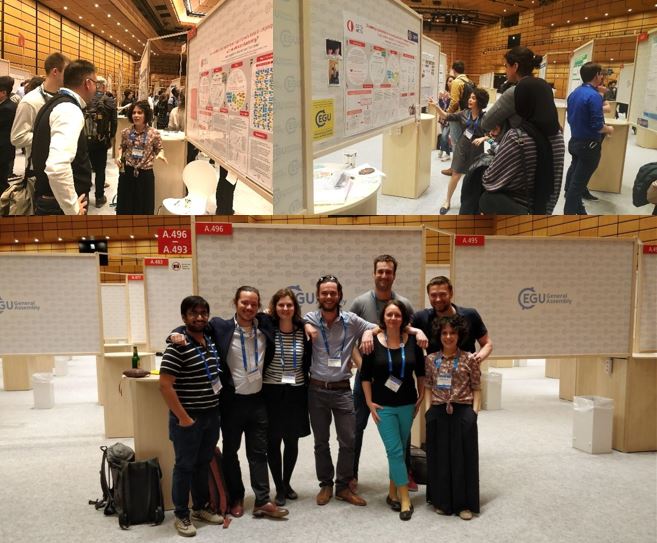
Right: EGU 2018 Poster 1—Clustering approaches for analysing similarity in ungauged catchments: input variable selection for hydrological predictions Left: EGU 2018 Poster 2—Input variable selection for hydrological predictions in ungauged catchments: with or without clustering? Bottom Centre: YHS team at EGU 2018 (with only a few missing! It is not east to arrange a common time for everyone, even for a group photo)
I also took over the role of EGU ECS Rep for HS division from Shaun Harrigan at EGU 2017. Being elected as the EGU ECS Rep, I became more enthusiastic about advancing the hydrologic science community equally (and globally) in support of, primarily, the ECS. The ECS Rep is expected to contribute to sustainable and inclusive growth of the EGU HS division by fostering the active participation and integration of ECS and the hydrologic science community globally under the umbrella of EGU, keeping in mind the necessity of creating equal opportunities for ECS to enhance their research and communication skills.
The ECS Rep for HS division works in close collaboration with YHS to initiate and support inspirational and intelligent ideas in line with the emerging needs of ECS. You also meet with ECS Reps of other EGU divisions and help the EGU community thrive together with its early career members. My term ends in April 2019. So keep your eye on EGU and YHS websites (and twitter) in early 2019—and apply to become the next EGU ECS Representative (April 2019-April 2021) for the HS division!
Do you have any parting words about your time involved with EGU?
It has been a very long post but now here are the last words. The EGU GA means seeing old friends and past professors, meeting fellow hydrologists and listening to presentations from enthusiastic researchers… plus the annual Hydrodrinks event among many other scientific sessions and short courses organized by YHS! I am glad to serve as the EGU ECS Rep for the Hydrological Sciences division – for the wonderful and inspiring people of the red floor:)
Acknowledgements: I would like to express my sincere thanks to Young Hydrologic Society, especially to Wouter Berghuijs, Shaun Harrigan, Hannes Müller and Tim van Emmerik, for their enthusiasm and support over the last five years.
Interview by Olivia Trani, EGU Communications Officer

